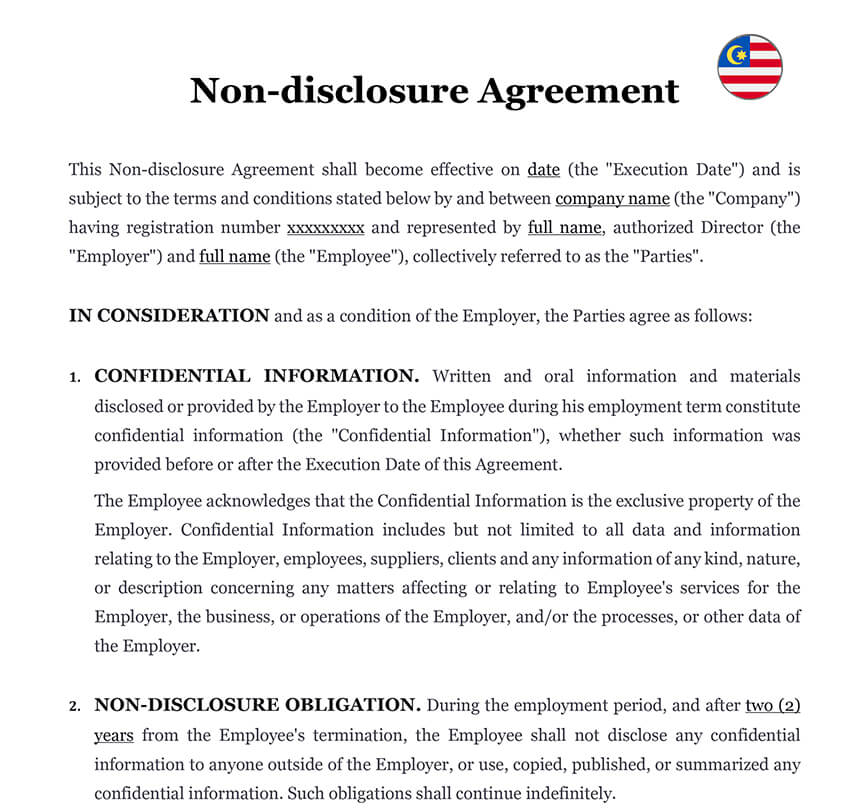Ready to use legal template
Drafted by experienced lawyers
Compliant with Malaysian law
Ready to use legal template
Drafted by lawyers
Compliant with Malaysian law
Learn more about Employee Confidentiality Agreement in Malaysia
An employee confidentiality agreement is a legally binding contract between an employer and an employee in which the employee agrees not to disclose any confidential information about the employer’s business. It is particularly useful at the end of an Employment Contract or when a company wants to ensure that its employee does not reveal any information after having sent a Warning Letter or even a Termination Letter. With our template, written by lawyers who follow the local jurisdiction, you can establish a culture of trust and integrity within your company and will be sure that your company has its confidential information and trade secrets protected.
Table of contents
-
What is an employee confidentiality agreement and why is it important?
-
What information are protected under an employee confidentiality agreement?
-
What are the legal implications for employees who violate it?
-
How can companies communicate and enforce it?
-
What are the best practices for drafting and implementing it?
-
How does it differ from other countries?
-
How can companies protect their confidential information in the digital age?
-
How do employee confidentiality agreements relate to non-compete agreements?
What is an employee confidentiality agreement and why is it important?
An employee confidentiality agreement is a legally binding contract between an employer and an employee that prohibits the employee from disclosing confidential information belonging to the employer.They are important for companies in Malaysia as they provide legal protection for a company’s sensitive information and help maintain the company’s competitive edge. Confidential information is often a crucial aspect of a business’s operations and it’s important for companies to keep it secure. They also help prevent former employees from using proprietary information for their own benefit after leaving the company. Additionally, it is also a way for a company to meet its obligations under laws such as the Personal Data Protection Act 2010, which require companies to take measures to protect personal data they handle.
What information are protected under an employee confidentiality agreement?
An employee confidentiality agreement typically protects a wide range of confidential information belonging to the employer. This can include :
1. Trade secrets such as confidential business plans, financial information, product development plans, and customer lists
2. Sensitive information about the employer’s operations, such as internal policies and procedures, and information about the employer’s employees and business partners.
3. Personal data of employees, clients, or customers.
The agreement may also prohibit employees from disclosing proprietary or confidential information to third parties, or from using it for personal gain.
ℹ️ Information protected under the Personal Data Protection Act 2010, such as personal data of clients, customers, or employees, are also protected under an employee confidentiality agreement.
What are the legal implications for employees who violate it?
Employees who violate an employee confidentiality agreement may face legal implications. The employee may be subject to disciplinary action by the employer, including termination of employment. If the violation causes harm to the employer, the employer may also have a claim for damages against the employee for breach of contract. Additionally, if the employee’s actions are found to be in violation of any laws or regulations, they may be subject to criminal or civil liability. For example, if the employee’s actions involve the unauthorised disclosure of personal data, they may be in violation of Malaysia’s Personal Data Protection Act 2010.
How can companies communicate and enforce it?
Companies can communicate and enforce employee confidentiality agreements by clearly outlining the terms and expectations in the agreement and providing training to employees on their obligations under the agreement. The agreement should be signed by the employee as a condition of their employment and should be prominently displayed in the workplace. Companies can also periodically remind employees of their obligations under the agreement and have strict disciplinary measures in place for any breaches.
Additionally, companies should have a process in place for handling and reporting any potential breaches of confidentiality. Our template is written by lawyers who follow the local juridiction to ensure that the confidentiality agreements comply with all applicable local laws and regulations in Malaysia.
What are the best practices for drafting and implementing it?
When drafting and implementing employee confidentiality agreements, it is important to :
1. Clearly define what information is considered confidential and what the consequences are for disclosing it without authorisation.
2. Specify how long the confidentiality obligation lasts, as well as any exceptions to the agreement.
3. Make sure that the agreement is consistent with any applicable laws or regulations. That is why themis partner offers you a template that is drafted by lawyers who follow the local jurisdiction
4. Have employees acknowledge in writing that they have read and understand the agreement, and to periodically remind them of their obligations under the agreement.
5. Have a process in place for handling breaches of the agreement and to enforce the agreement consistently.
How does it differ from other countries?
Employee confidentiality agreements in Malaysia differ from those in other countries in several ways. Firstly, companies operating in Malaysia must comply with local laws and regulations. This can include specific requirements for how agreements are drafted, what types of information are protected, and what the legal consequences are for employees who violate confidentiality agreements. Additionally, the culture of secrecy and confidentiality in Malaysia may be different from that of other countries, which can affect how agreements are viewed and enforced.
Another difference is the way that employees are protected in Malaysia, for example, the Employment Act in Malaysia protects employees from being dismissed without any valid reason, which may affect how companies in Malaysia enforce confidentiality agreements. Furthermore, the legal system in Malaysia may also have different procedures and timelines for resolving disputes related to confidentiality agreements compared to other countries.
Overall, while the basic principles of employee confidentiality agreements are similar across countries, companies operating in Malaysia must be aware of the specific laws and regulations that apply to them and take these into account when drafting and implementing confidentiality agreements.
How can companies protect their confidential information in the digital age?
Protecting confidential information in the digital age can be challenging for companies in Malaysia, as technology has made it easier for information to be shared and accessed by unauthorised parties. However, there are several measures that companies can take to safeguard their confidential information.
| ➤ One important step is to implement strict security protocols and controls, such as firewalls, encryption, and password protection, to protect sensitive information stored on company servers and devices. |
| ➤ It's also important to educate employees on proper cyber security practices and the importance of keeping confidential information secure. |
| ➤ Companies can use advanced technologies like data loss prevention software, which can detect and prevent the unauthorised sharing of sensitive information. |
| ➤ Another important step is to review and update company policies and procedures regularly to ensure that they are in line with current industry standards and best practices. Implementing regular security audits and vulnerability assessments can also help identify any potential risks and vulnerabilities that need to be addressed. |
| ➤ Finally, it's important for companies to have a clear plan in place for responding to any data breaches that may occur and to have an incident response team to help mitigate the damage. |




